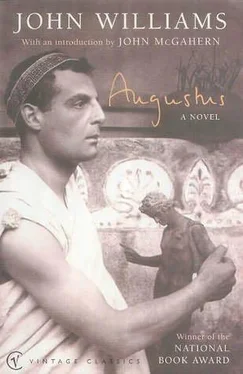John Williams - Augustus
Здесь есть возможность читать онлайн «John Williams - Augustus» весь текст электронной книги совершенно бесплатно (целиком полную версию без сокращений). В некоторых случаях можно слушать аудио, скачать через торрент в формате fb2 и присутствует краткое содержание. Жанр: Историческая проза, на английском языке. Описание произведения, (предисловие) а так же отзывы посетителей доступны на портале библиотеки ЛибКат.
- Название:Augustus
- Автор:
- Жанр:
- Год:неизвестен
- ISBN:нет данных
- Рейтинг книги:3 / 5. Голосов: 1
-
Избранное:Добавить в избранное
- Отзывы:
-
Ваша оценка:
- 60
- 1
- 2
- 3
- 4
- 5
Augustus: краткое содержание, описание и аннотация
Предлагаем к чтению аннотацию, описание, краткое содержание или предисловие (зависит от того, что написал сам автор книги «Augustus»). Если вы не нашли необходимую информацию о книге — напишите в комментариях, мы постараемся отыскать её.
Augustus — читать онлайн бесплатно полную книгу (весь текст) целиком
Ниже представлен текст книги, разбитый по страницам. Система сохранения места последней прочитанной страницы, позволяет с удобством читать онлайн бесплатно книгу «Augustus», без необходимости каждый раз заново искать на чём Вы остановились. Поставьте закладку, и сможете в любой момент перейти на страницу, на которой закончили чтение.
Интервал:
Закладка:
All of this has happened so quickly that I can hardly believe it, and I still do not fully understand the reasons for the appointment. Perhaps it is because I am nominally a Jew yet a philosopher and no fanatic, and because my father has had some small business connection with the court of King Herod, whom Marcus Antonius has recently legitimatized as King of all Judaea and with whom he wants to live in peace. Could politics touch one so unpolitical as myself? I hope that I am being too modest; I would like to think that my reputation as a scholar has had the final weight in the matter.
In any event, I was approached by an emissary of the Queen at Alexandria, where I had gone on some business for my father, in the course of which I took the time to make use of the Royal library; I was approached, and I accepted at once. Aside from the material advantages of the position (which are considerable), the Royal Library is the most remarkable I have ever seen; and I will have continual access to books that few men have used or even seen before.
And now that I am a member of the Royal household, I travel wherever the Queen goes; thus, I arrived in Antioch three days ago, though her children remain in the palace at Alexandria. I do not fully understand why the ceremonies were held here, rather than in the Royal palace at Alexandria; perhaps Antonius does not wish to flout Roman law too openly, even though he seems to have cast his fortunes in the East (what is the Roman legality of this matter, I wonder, since, it is said, he has not bothered to obtain a legal divorce from his former wife?); or perhaps he merely wants to make clear to the Egyptians that he does not usurp the authority of their Queen. Perhaps there is no meaning.
However that may be, the ceremonies have been held; and to all the Eastern world, the Queen and Marcus Antonius are man and wife; and whatever Rome may think, they are the joint rulers of this world. Marcus Antonius has announced publicly that Caesarion (known to be the child of his one-time friend, Julius Caesar) is heir to the throne of Cleopatra, and that the twins that the Queen has borne are to be considered his legitimate offspring. He has, moreover, increased the extent of Egypt's possessions many-fold; the Queen now has under her authority all of Arabia, including Petra and the Sinai Peninsula; that part of Jordan which lies between the Dead Sea and Jericho; parts of Galilee and Samaria; the whole of the Phoenician coast; the richest parts of Lebanon, Syria, and Cilicia; the whole of the Island of Cyprus, and a part of Crete. Thus I, who was once a Syrian Roman, might now consider myself a Syrian Egyptian; but I am neither. Like you, my old friend, I am a scholar, who would be a philosopher; and I am no more Roman or Egyptian than was our Aristotle a Greek, who never lost his love and pride for his native Ionia. I shall emulate that greatest of all men, and remain content to be a Damascene.
Yet as you yourself have so often said, the world of affairs is an extraordinarily interesting one; and perhaps neither of us, even in the arrogance of our youth, ought to have so removed ourselves from it in our studies. The way to knowledge is a long journey, and the goal is distant; and one must visit many places along the way, if he is to know that goal when he arrives at it.
Though I have seen her at a distance, I have not yet had an audience with the Queen by whom I am employed. Marcus Antonius is everywhere-jovial, familiar, and not at all forbidding. He is a little like a child, I think-though his hair is graying, and he is getting a bit fat.
I think I shall again be happy in Alexandria, as I was during our student days.
As I believe I mentioned in my last letter to you, I had seen the Queen only at a distance-at the wedding ceremony which united her to Marcus Antonius and the power of Rome, a ceremony which only those attached to the Royal household were allowed to attend.
The palace at Antioch is not so imposing as that in Alexandria, but it is grand enough; and at the wedding, I was crowded to the rear of the long hall, from which vantage I could make out very little, though an ebony dais had been raised, upon which Cleopatra and Antonius stood. All I could see of the Queen was her jeweled gown, which sparkled in the torchlight, and the great disk of gold representing the sun, which was set above her crown of state. She moved in a slow and grave manner, as if she were indeed the goddess that her title proclaims her to be. It was an extraordinarily elaborate ceremony (though described by some of my new friends as really rather simple), the significance of which I do not understand; priests marched about and chanted various incantations in that ancient form of the language which only they can speak; anointings with various oils were made; wands were waved. It was all very mystifying and (I must confess I thought) rather uncivilized, almost barbaric.
And so I went to my first audience with the Queen with an odd feeling, as if I were going into the presence of some Medea or Circe, neither quite goddess nor quite woman, but something more unnatural than either.
My dear Strabo, I cannot tell you how fortunately I was surprised, and how happy I was at my surprise. I expected to encounter a swarthy and rather hefty woman, such as one sees in the market place; I met a slender woman of fair skin and soft brown hair, with enormous eyes, who had poise and dignity and an extraordinary charm, who put me at ease at once and bade me sit near her on a couch no less luxurious than her own, as if I were a guest in a simple and friendly household. And we spoke at length upon those ordinary topics which constitute any civilized conversation. She laughs easily and quietly, and seems totally attentive to her audience. Her Greek is impeccable; her Latin is at least as good as mine; and she speaks casually to her servants in a dialect I cannot understand. She is widely and intelligently read-she even shares my admiration for our Aristotle, and assures me that she knows my own work upon his philosophy, and that her understanding has been enhanced by that knowledge.
I am not, as you know, a vain man; and even if I were, I believe my vanity would have been overwhelmed by my gratitude and my admiration for this most extraordinary of women. That one so charming could also rule one of the richest lands in the world is almost beyond belief.
I have been back in Alexandria for three weeks now, and I have begun my duties; Marcus Antonius and the Queen remain in Antioch, where Antonius is making preparations for his march, later in the year, against the Parthians. My duties are not heavy; I have as many slaves as I need for the management of the Queen's library, and the children take up little of my time.
The twins-Alexander of the Sun and Cleopatra of the Moon -are only a few months more than three years old, and therefore not capable of taking any instruction; but I have been directed to speak to them each day, for a few moments at least, in Greek and (at the Queen's insistence) even in Latin, so that when they grow older the sounds of the language will not be unfamiliar to their ears.
But Ptolemy Caesar-called Caesarion by the people-who is almost twelve years old, is another matter. I believe I would have guessed that he might be the son of the great Julius Caesar, even had I not known it. He recognizes his destiny, and he is prepared for it; he swears that he remembers his father from his mother's residence in Rome, just before the assassination- though he could hardly have been four years old at the time of that event. He is serious, utterly without humor, and oddly intent on whatever he does. It is as if he never had a childhood, and did not want one; he speaks of the Queen as if she were not his mother at all, but only the powerful sovereign that she is; and he awaits the day of his assumption of the Queen's throne, not impatiently, but with the same certainty that he waits the morning sunrise. He would frighten me a little, I believe, if he were to hold the vast power that his mother now has.
Читать дальшеИнтервал:
Закладка:
Похожие книги на «Augustus»
Представляем Вашему вниманию похожие книги на «Augustus» списком для выбора. Мы отобрали схожую по названию и смыслу литературу в надежде предоставить читателям больше вариантов отыскать новые, интересные, ещё непрочитанные произведения.
Обсуждение, отзывы о книге «Augustus» и просто собственные мнения читателей. Оставьте ваши комментарии, напишите, что Вы думаете о произведении, его смысле или главных героях. Укажите что конкретно понравилось, а что нет, и почему Вы так считаете.











